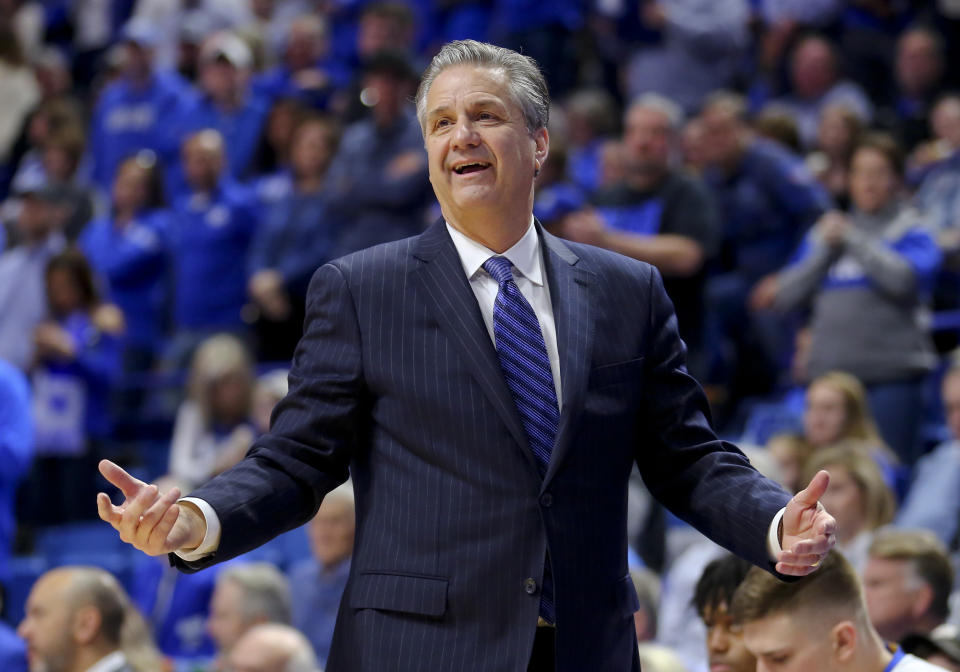John Calipari on new transfer rule: 'We’re going to be handing out business cards in the handshake line'
When the NCAA considers significant changes to the college basketball ecosystem, chances are John Calipari has an opinion. And when Calipari talks, the college hoops world listens.
So it was notable when, on an SEC teleconference Monday, Calipari took a question about the FBI’s investigation of hoops corruption and turned it into a long-winded take on a proposed NCAA rule change that would allow football and basketball players to transfer and be eligible immediately.
The Hall of Fame coach, after breaking down the pros and cons of the rule, came to the conclusion: “It’s crazy.”
“I’ve coached at all different levels,” Calipari began, after saying the new legislation would be the “biggest impact” of the various corruption investigations. “This – if they go with it, which I hear they are – it doesn’t hurt Kentucky, it helps us. We’re going to have all kinds of calls, kids wanting to join our program. ... OK. But what does it do to all the mid-majors, low majors, or even the bottom half of the Power Fives?”
Calipari, in considering the rule, has put himself in the shoes of those coaches, the ones who make up a strong majority of Division I college basketball. “I mean, now, who do you recruit?” he asked. “Do you recruit junior college players to know you’ll have ’em? Do you get grad transfers? If you get a really good high school player, is he gonna stay more than one year? Or, if he leaves, what’s it do to the kids in the program – not just him?”

There would, presumably, be penalties for what most professional sports governing bodies consider “tampering.” Coaches wouldn’t, or shouldn’t, be able to actively recruit content players from rival schools in the middle of seasons. The problem, Calipari seemed to say, is enforcement. How do you ensure tampering gets penalized?
His idea is that a coach found guilty should lose his job. “Go to the phones,” Calipari said. “If I called an AAU coach or a high school coach, and he called the kid, we just tampered, I get fired. You fire the coaches.”
However, he conceded: “I just don’t know if they [NCAA officials] are capable of doing that.”
And if they’re not? “We’re going to be handing out, in the handshake line, business cards, when the games end,” Calipari said. “I mean … people don’t know the unintended consequences, and they haven’t talked to coaches enough.
He essentially acknowledged that the current system is flawed. And he clarified: “If a kid has a reason [to transfer] – let’s say a kid was lied to: ‘You’re gonna start and play 30 minutes a game,’ and it was a total lie – the kid should be able to leave. ... Or if both sides understand, ‘You picked the wrong school, you shouldn’t be here,’ and both the coach and the player [agree] – I get that.”
But trying to distinguish between acceptable transfers and unacceptable ones doesn’t seem feasible. That’s what the current system necessitates. It’s what any system necessitates. “I don’t know how you deal with that,” Calipari admitted.
And so he hasn’t proposed his own solution. He’s just skeptical of the one the NCAA’s working group has outlined, one that would align the revenue sports with all other NCAA sports on immediate transfer eligibility. “To just have a blanket [rule] because they do it in track, or they do it in gymnastics, we should do it in football and men’s basketball?” he asked rhetorically.
“I mean, it’s crazy.”
More from Yahoo Sports:

 Yahoo Finance
Yahoo Finance 
